HIT CHANNEL EXCLUSIVE INTERVIEW: July 2017. We had the great honour to talk with a legendary musician: Denny Laine. He is best known as the lead singer, guitarist and founding member of The Moody Blues. In 1971, he formed Wings with Paul McCartney. He has also a very interesting solo career. Denny just released the singles “Meant to Be” and “Over the Horizon”. Read below the very interesting things he told us:
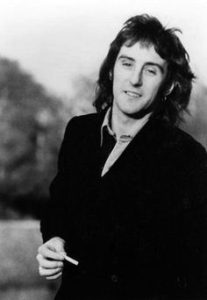 Are you satisfied with the feedback you received so far for the new singles “Meant to Be” and “Over the Horizon”?
Are you satisfied with the feedback you received so far for the new singles “Meant to Be” and “Over the Horizon”?
Yes, it is just starting to get good reviews and people like it and play it all over the place. Yes, I have some new material out to market.
Is there any concept or basic idea behind those two songs?
Yes, the songs are featured as part of an environmental project that I am involved with. It is called the Wyland Foundation. Wyland is a very famous seascape artist. It’s his picture that is on the front of the sleeve that he painted, of the two whales. He has saved the sea life in the Florida Keys. So, that’s the concept behind songs. There is an environmental essence on the songs.
When your upcoming album “Valley of Dreams” will be released?
I am trying to get it out for September. But we are having a problem with the artwork at the moment. I was hoping that it would be out in August, but probably it will be out in September.
Do you have any famous special guests on “Valley of Dreams”? In a past interview, you said that you would like to work with your old friend John Paul Jones (Led Zeppelin –bass/keyboards).
(Laughs) No, I don’t have anybody on that album. John Paul Jones did the string arrangements on a song of mine, “Say You Don’t Mind” many years ago (ed: 1967) and Colin Blunstone from The Zombies had a hit with his version of that song. I had worked with John Paul Jones on arrangements before. It would be nice to work with him in the future, but he didn’t actually participate in this album.
Are you looking forward to perfoming at Jorma Kaukonen’s Fur Peace Ranch?
Yes. I have never done a workshop before, but it’s a singer/songwriter workshop and I am looking forward to passing a few tips that I use to other musicians.
Are you currently involved in other projects?
Yes, I have a musical. It is called “Arctic Song” and it’s about the Arctic region, in the North Pole. Again, that is an environmental piece. I have composed many songs. I work on it for many years and now it has become more current because of the situation of the world today. Suddenly, it gets recognition. I am hoping that I will bring that out in the next three months as well.
Did you expect the commercial success of the Moody Blues’ single “Go Now” (1964)?
Well, I knew it was a good song and it had possibilities. But we were doing the Chuck Berry tour and Chuck Berry obviously was very famous in England and because of that, it helped to push the songs on the top of charts. Yes, we were very happy with that piece of music.
Do you have happy memories of The Moody Blues tour with The Beatles in December 1965?
Yes, we obviously knew The Beatles before we work with them and we were quite close friends and it was nice to be on a tour with people that we actually knew well. It was a great experience to see the fans’ reaction to The Beatles and travel around with them. As I said, I knew Paul before Wings very well. In fact, I joined Wings because he knew me since those days.
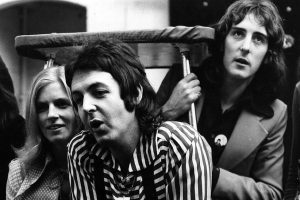 How helpful was Brian Epstein’s management to The Moody Blues?
How helpful was Brian Epstein’s management to The Moody Blues?
It wasn’t so much management. It was more because of his agency which was called NEMS and we toured with a lot of his people in that agency like Billy J. Kramer. But we didn’t use Brian as a manager of such, it was more Brian’s agency. Again, we knew Brian very well and he looked after us. We basically managed ourselves.
Why you decided to leave The Moody Blues?
Because I wanted to go and do something as a solo artist. I thought we needed to go to the studio, but in those days you didn’t go to studio, because there was a lot of live work. Also, I was the youngest member and it was time to go on and follow a solo career. But it was very amicable and I’m still friends with those guys.
How important was the concert of your Electric String Band with the Jimi Hendrix Experience at the Saville Theatre on 4 June 1967?
It was very good for me because I tried to get recognition for about a year before I get that concert. When I did that concert, Paul, John and Peter Asher were in the audience. Everybody liked the show, we had done very well and even Jimi Hendrix complimented me on that show, on the fact that I was doing something different, because Jimi was a creative artist and he wanted to move forward with his music. I think he admired that fact on my music. Again, one of the reasons Paul called me to join Wings was that he was on that show.
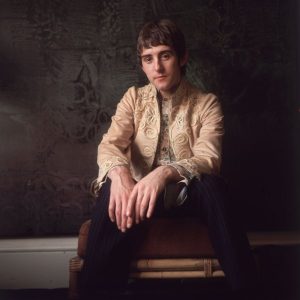 You are one of the first people who watched Jimi Hendrix playing at the Bag O’ Nails. What was your first reaction?
You are one of the first people who watched Jimi Hendrix playing at the Bag O’ Nails. What was your first reaction?
You know, I always loved guitar players. I was with Paul when that happened. We went to see Hendrix together. We were impressed by the fact that he was a great guitar player. We knew that he was gonna be big because he was managed by Chas Chandler from The Animals. I knew Chas well and he had a good organization at the time. I don’t know how happy he was with that management further down the road, but at that time, they were powerful and I knew that with their backing he was gonna be a big star.
Are you proud that “Band on the Run” (Wings -1973) is consider as classic album?
Oh yes, very much so. I think it has a special feel because it’s just me and Paul playing the instruments and it had a different feel to any of the other albums. In fact, I have been going around with my own band performing that album because I feel much closer to that album than any of the other albums. Yes, I’m very proud of this.
What was it like to be Paul McCartney’s closest collaborator for 10 years?
We worked very well together because we were friends. It’s not difficult to work with a friend. I think we had the same sort of background: we listened to the same music. We had a very close relationship musically. So, it was very easy and that’s why we had so much success, I believe: The fact that we were friends.
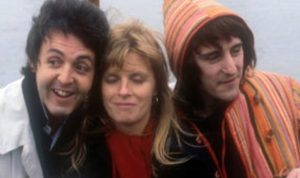 Why Wings never played in Japan?
Why Wings never played in Japan?
Well, everybody knows the story why (laughs). Paul had a problem (ed: arrested for possession of marijuana), we all know that’s the story. I was there. We went in there. He ended up as you know in jail. That’s why we hadn’t played there. We couldn’t go back and get visas to a place after something like that. It gets at least five years to get back from that situation. Indeed, it took him five years to get back there as a solo artist.
Was it difficult to persuade Paul to produce your “Holly Days” (1977) solo album?
No, there was no difficulty. Originally, I was gonna do it with session musicians in Nashville but the producer, Ray Stevens, wasn’t available at the time –he was busy- so Paul started to make the backing tracks in Scotland. When I went up there, we finished up the album. That is because I didn’t have the time to do it with other people. It turned out pretty good, because it was more fun to do that with a friend.
How emotional was it to record “All Those Years Ago” with George Harrison, Ringo Starr and Paul just a few months after John Lennon’s assassination?
Oh, that was very emotional. I knew George very well too and Ringo. So, it was a very emotional time and it was recorded at George’s house. As I said I knew all the Beatles quite well and although I wasn’t as close to John as they were, he was a pretty good friend of mine. It was good that we did that. We got something out there to the public to see that we were concerned and hurt by what happened.
Do you miss the atmosphere of the shows at the legendary UFO Club? I ‘ve talked with Joe Boyd (co-owner of the club and producer) and Arthur Brown too.
(Laughs) Well, that was a good period for me. It was the underground scene in London and that was where I wanted to be. I was doing something in that vein with all the other artists: Pink Floyd had just started and as you said Arthur Brown, and this was the kind of market that I liked to work with: Very progressive and creative. Yes, UFO was the place we all had a bit of a following. We had a cult following there.
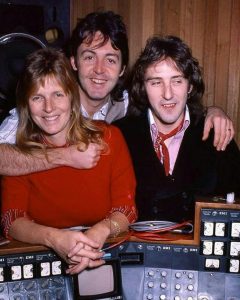 Do you think popular music that was written in the ‘60s and ‘70s is much better than today’s music?
Do you think popular music that was written in the ‘60s and ‘70s is much better than today’s music?
No, I don’t think it’s better. I think there is still as much talent out there as there was then. There are talented people. Some say that in our time there is no talent. Always, there will be new talents. They are gonna be just as good as those we had then, because obviously everybody now has been influenced by older artists. We were influenced by people that came before us. I think the ‘60s was the renaissance of bands. After the war in England many bands were formed and they had a big musical following. Not only in music, but in fashion and anything else. So, I think that made it more of an event that the music of today isn’t. Today’s music doesn’t have the same kind of impact as it did in those days. I still love what there is out there. But the music scene has changed. It has become more refined and more knowledgeable. The music business in the old days was very-very difficult to cope with, but in these days everybody has more knowledge to share. But again, I think it’s harder in some ways to get popular.
Did you get on well with Ginger Baker when you played at Ginger Baker’s Air Force?
Yes, I was friends with Ginger many years before because I was on a Chuck Berry tour. He and Jack Bruce were part of a band called Graham Bond Organisation and they were also on that tour. So, I had again a friend from many years before and therefore it was very easy to work with him. As I say, I have known Ginger for so many years. I wasn’t looking forward to working with him, it just happened that way. He wanted to do something. We were at a party at the beginning of Blind Faith. I went to visit Traffic a few times and at the beginning of Blind Faith I jammed with Ginger and Eric and then when Blind Faith folded, Ginger asked me to join another band, Ginger Baker’s Air Force.
How did you get to own Pete Townshend’s iconic black Gretsch guitar?
Because I used to live close by to where The Who had their offices and they were selling some of their old equipment, because they used to have a hire company renting all their old equipment. I was working at a recording studio at the same premises, which were called Shepperton Film Studios and The Who had their company there, which was called ML and it was there their rental company. I lived close by and I was recording there in a place called Rock City Studios, within that complex and the studio manager at the time told me that the guitar was for sale. So, I got to own this guitar.
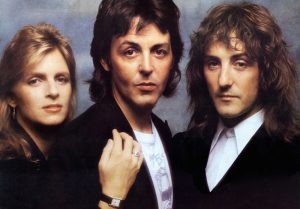 Mike Pinder (Moody Blues keyboardist) said the original line-up of The Moody Blues witnessed a UFO while coming back from a Manchester concert. Do you remember this incident?
Mike Pinder (Moody Blues keyboardist) said the original line-up of The Moody Blues witnessed a UFO while coming back from a Manchester concert. Do you remember this incident?
(Laughs) Yes, I still do but I don’t remember much about it, really. I think I saw a light but Mike is that sort of person that thinks it was a UFO. Who knows whether it was a UFO or something else? But I saw a light in the sky, yes. I still see when I am travelling late at night when I come back from shows (laughs). But I don’t know how it chose me.
Can you tell us a few words about your friendship with Brian Jones?
Brian and I became friends because again we used to go to a lot of shows together in London. Brian was also very creative. I think he was the main creative force behind the Stones. I had that in common with him. We had a lot of ideas that we used to talk about. Basically, we loved the same kind of music which was the blues. Brian was more or less an aficionado of the blues. We had a lot in common, that’s it. Again, these people I knew in the ‘60s, I never really had much to do with after that period. I wasn’t there when Brian lost his life but yeah, it is very sad that there is a story like that. Because as I said, he was a huge talent. A lot of people don’t even realize that: how much talented he was.
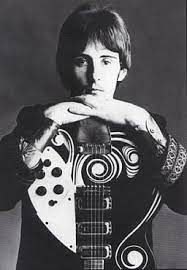 Did you get to know Syd Barrett?
Did you get to know Syd Barrett?
No, I didn’t get to know him, but I did know him in a sense because I used to play the same venues. I was told that Syd Barrett was the driving force behind Pink Floyd because of his concept and his style. He was really the main man, as far as I am concerned. But of course when Dave Gilmour came in, he was a great guitar player and he added to Floyd in that sense. But you know, when you walk into a band that is already famous, I think it’s easy. It had to have Syd Barrett in the first place to be successful because his concept and style were apparent on the very early shows. I mean he went down to do these visuals, the oil lamps and the style of these very avant-garde lyrics. He was a great writer. Unfortunately, he didn’t have a chance to develop, but that happened to a lot of people in those days. Syd Barrett was very passionate about what he was doing.
Pete Townshend has said that he missed a Who concert because he and Eric Clapton went to the UFO Club to watch Syd Barrett.
Yes, it’s not hard to imagine that they would. Obviously, I know Eric and I know Pete and they were very interested –we all were very interested- in everything that was going on at the time, like me and Paul going to the clubs together. Whoever was doing something different, they would go and see. Yes, he was very influential as far as ideas and his style was different. That’s what we all were able to see. We enjoyed Syd.
A huge “THANK YOU” to Mr Denny Laine for his time and to Elizabeth Mele for her valuable help.
Official Denny Laine website: http://www.dennylaine.com
Official Denny Laine Facebook page: https://web.facebook.com/DBFLaine

